World
Imprisoned and exiled, a Nicaraguan activist rebuilds her life in the US
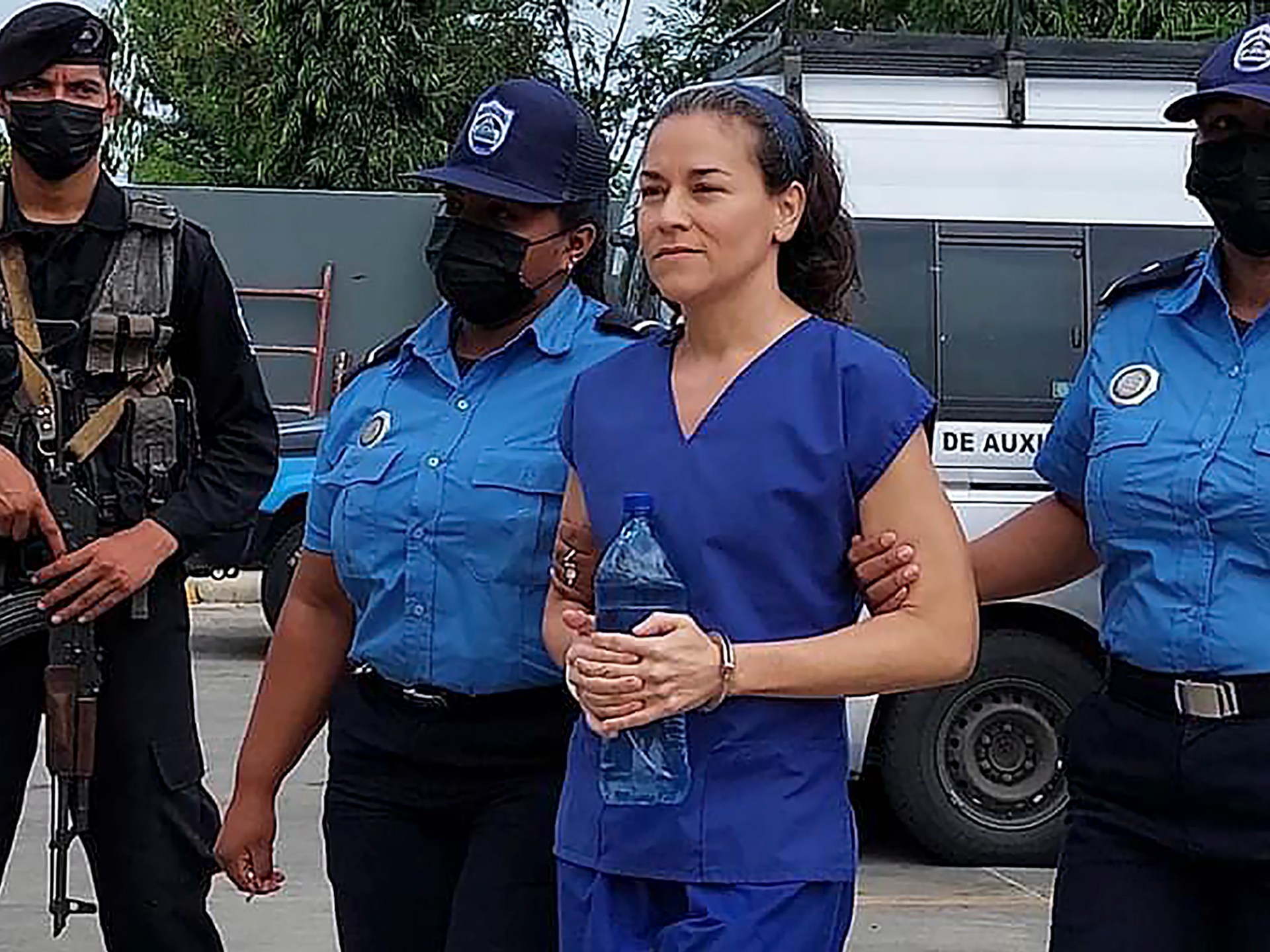
As her isolation in Nicaragua’s infamous El Chipote prison stretched month after month, Tamara Davila held fast to the conviction that she would one day be free to see her daughter again.
But freedom would ultimately take her farther away than ever. Six months ago, on February 9, Davila was one of 222 Nicaraguan political prisoners packed onto an aeroplane and sent into exile in the United States, there to face an uncertain future.
Even now, Davila struggles to describe how she felt boarding the plane.
“It was crazy. It was a mix of feelings — of joy but, at the same time, this sensation of losing everything,” she told Al Jazeera in a recent telephone interview. “Because my daughter was staying in the country. My house, all the things that I knew stayed there.”
What Davila and the other former prisoners found abroad was not an end to their punishment but a continuation of their struggle. Far from home, their Nicaraguan citizenship would be stripped and their property confiscated as the government of President Daniel Ortega branded them “traitors to the homeland”.
“It was not easy. It is still not easy,” Davila said.
A former rebel leader in the left-wing Sandinista movement, Ortega has been in and out of power since the late 1970s. But in recent decades, he has faced mounting criticism for his repressive stance towards activism and dissent.
As recently as June, the United Nations expressed concern that Nicaragua was “actively silencing any critical or dissenting voices in the country”. It noted that media outlets had been forced to shutter and other organisations had seen their legal status revoked — including 3,200 groups in the previous year alone.
State violence, however, hit a zenith in 2018, when cuts to social security sparked widespread anti-government protests. The Inter-American Commission on Human Rights has estimated at least 355 people died in subsequent clashes with security forces.
That was when Davila started to become more politically involved. Raised in a family that taught her not to be indifferent to suffering, Davila said she had long been drawn to feminism — another target of state repression.
“When movements cannot be controlled, it’s hard for any government,” said Victoria Gonzalez-Rivera, a professor at San Diego State University who studies women’s rights and LGBTQ history in Nicaragua.
“A trademark of feminism is women making their own decisions and being politically independent. And that generally clashes with most political parties and most governments.”
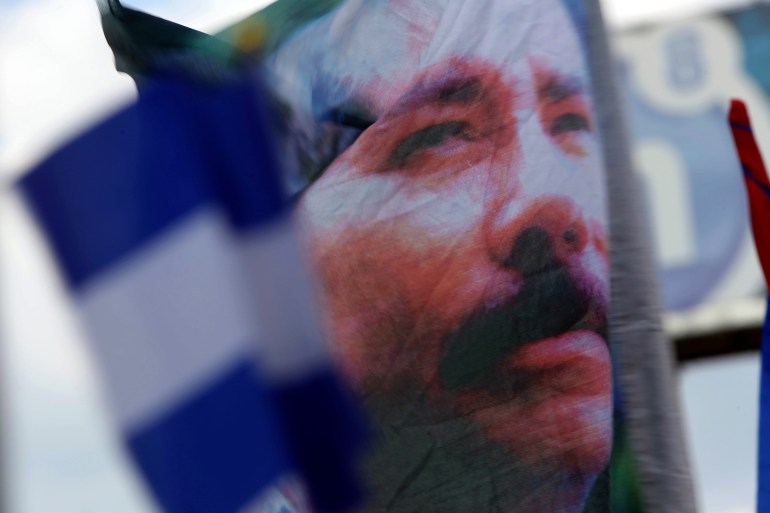
Years of activism
Davila felt particularly compelled to act because of the violence facing women in Nicaragua. One study published in 2020 (PDF) estimated that 27 percent of Nicaraguan women experienced intimate partner violence in 2016.
“The women that are in the country and need to be helped because they are suffering violence, they don’t have anywhere to go, because the state is not providing this medical attention,” Davila said. “And the women’s organisations that were doing that work, they don’t exist any more because the regime has cancelled those organisations.”
Davila ultimately found her passion for human rights reflected in the progressive political party UNAMOS, part of a coalition that formed in 2018 against Ortega’s government. But she was young, female and outspoken. That made her a target, she said.
“There were few women who were really visible at that moment in the national political sphere,” Davila, now 42, said. “We were using our voices to denounce the regime and dispute its power, even from a position of repression.”
In June 2021, with presidential elections fast approaching, the Ortega government began arresting political rivals — including the leader of UNAMOS, Suyen Barahona, and members like Davila.
They were taken to El Chipote, a prison north of the capital Managua that is infamous for what the UN termed “inhuman conditions”.
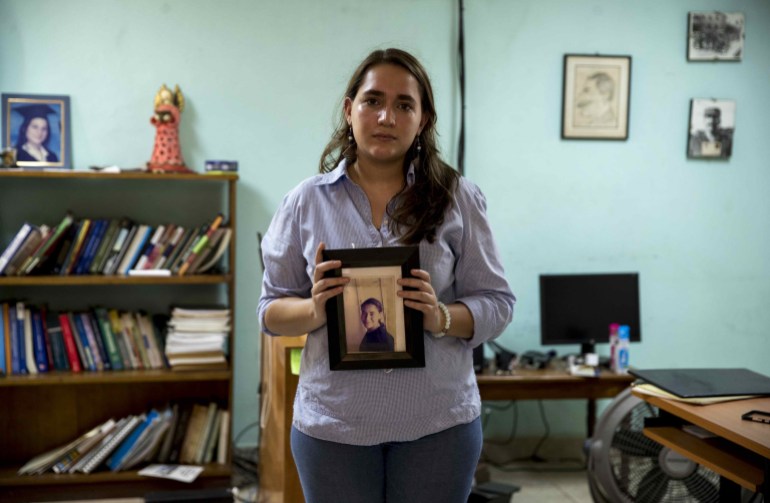
‘I knew I would leave’
Davila’s first days there were in complete isolation. The walls of her cell were thick: She could see no one, she recalled. Her only interactions came when the guards slid food through a slot in the door.
“It was horrifying,” she said. But she promised herself she would leave stronger than ever. After all, she thought, her five-year-old daughter needed her to stay healthy.
“I started to do my routine. I woke up early. I walked. I did exercises. I prayed. I sang. I did everything to make the time inside pass fast,” Davila explained. “I knew I was going to get out of there. I didn’t know when. But I knew I would leave one day.”
Six hundred and seven days ultimately passed. At the end, Davila began to suspect the guards were preparing to transfer her to a prison in Tipitapa. It was only when they placed her on a bus to the airport that she realised they had another destination in mind.
“One of the police officers came to us and brought to me a paper that I should sign. And the paper said that I will be transferred to the United States,” she said.
As she climbed onto the waiting plane, she noticed familiar faces: activists she had known before her incarceration. An official greeted her as she boarded, “Welcome to the United States, Tamara. You are free.”
But her mind started to whirl. What would she do in the US? What about her daughter? Her house? Her life and family in Nicaragua? Flooded with emotion, she began to cry.
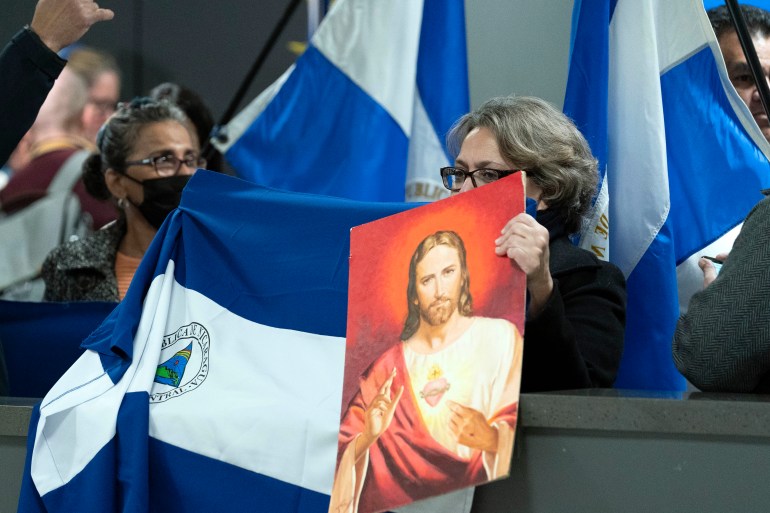
Psychological toll
Elizabeth Nugent, a Princeton University professor who studies activists in exile, said the experience can be “a major trauma” for someone dedicated to advocacy. “This really is a committed nationalist who was trying to reform their country,” she told Al Jazeera.
Nugent said being in exile can sometimes get conflated with other categories of migration in ways that erase the challenges associated with it. Refugees may not have been politically active in the same way an exiled activist has. And Nugent bristled when exile is framed as a kind of “freedom”.
“There’s often this assumption that things are so much better when you leave. There are lots of issues with that,” Nugent said. “Marginalised communities are marginalised everywhere.”
Exile is also no guarantee of safety, she added. Dissidents can continue to be targeted through transnational repression, which can involve efforts to intimidate an activist abroad — or threats against family members who stay behind.
“Being removed physically doesn’t protect an individual activist from the physical repression of the home regime,” Nugent explained.
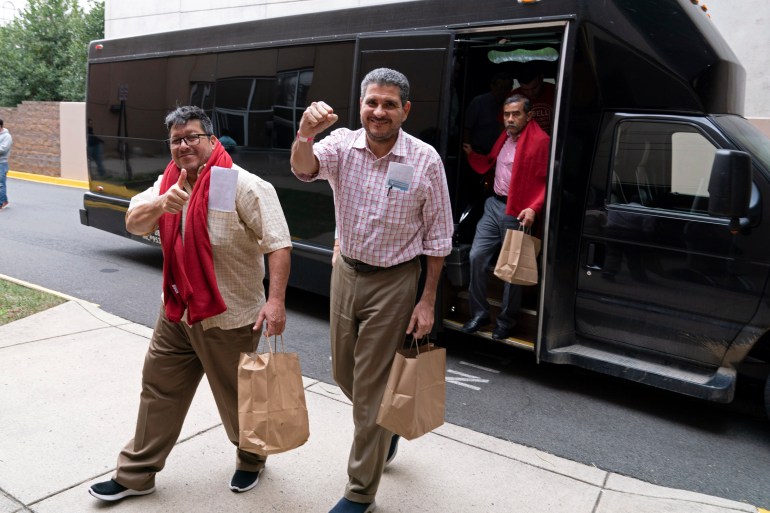
Hurdles of life in US
When Davila and the other former political prisoners landed in Washington, DC, they were quickly shuttled to a hotel near the airport.
Over the next few days, officials helped her and other exiled dissidents contact family members who might house them. The US had offered them two years’ stay in the country. Spain, meanwhile, extended citizenship to the exiled dissidents after Nicaraguan legislators voted to strip them of their nationality days after their departure.
“For me, it was like: I don’t care if they do that. I’m still a Nicaraguan woman,” said Davila of losing her citizenship. “But in practical, day-to-day life, you need your documents for living these days.”
Paperwork also proved a hurdle when it came to reuniting with her daughter, who had been staying with Davila’s mother and sister in Nicaragua. Her child did not yet have a passport, and Davila feared what might happen if she applied for one with the Nicaraguan government.
The only solution seemed to be to leave the country irregularly, so Davila’s mother, sister and daughter crossed the border into Costa Rica and applied for the child’s travel documents there.
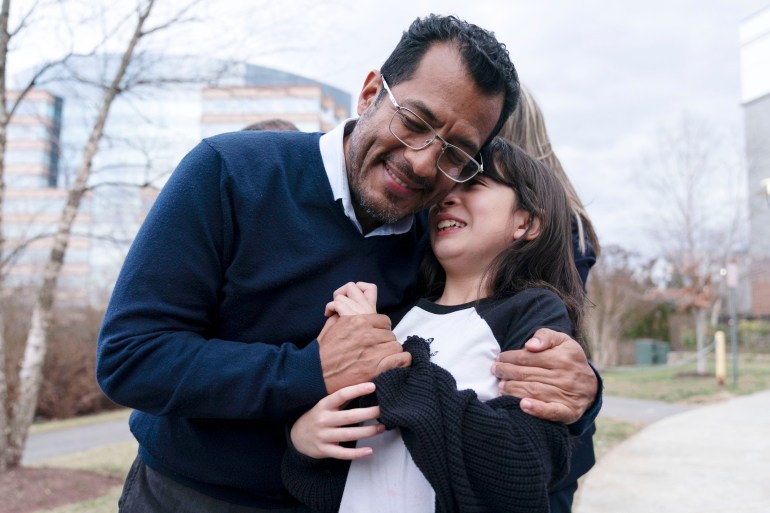
By the time Davila’s daughter finally arrived in the US, it was April. And the five-year-old Davila remembered had grown into a seven-year-old with the same green eyes, the same inquisitiveness — and yet somehow different.
Her daughter had a similar reaction. The little girl took Davila’s face in her hands, inspecting how thin she had become since her incarceration, how long her hair had grown. “Mom, how different you are,” the child remarked.
The reunion was “magic”, Davila recalled. “It was just at that moment that I became truly free.”
Adapting to life in a new country has not been easy, though. “We’re living together day by day,” said Davila. “‘Un dia a la vez,’ as we say in Spanish. ‘One day at a time.’”
Ultimately, she remains optimistic she can continue to work for change in Nicaragua, even from afar. “We will have democracy in my country,” she said. “Sooner rather than later, we’ll have it.”

World
Italian state railways plans 1.3 bln euro investment in solar plant

World
Christmas in Puerto Rico is a 45-day celebration with caroling, festive decorations, family feasts and more
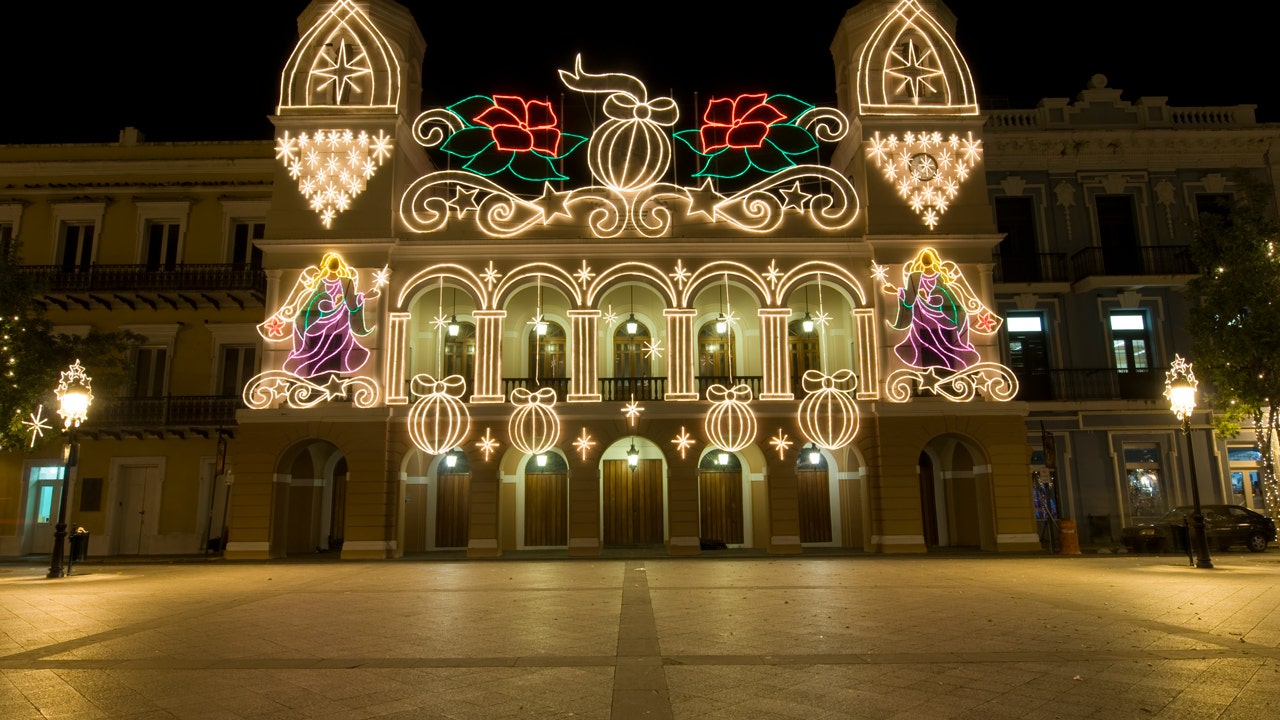
Christmas, Navidad in Puerto Rico, extends far beyond Dec. 25.
The island proudly proclaims itself as having the “longest holiday season in the world,” according to the website Discover Puerto Rico.
On average, the holiday festivities in Puerto Rico last about 45 days, per the source, commencing right after Thanksgiving, and stretching all the way through mid-January.
The Christmas season in Puerto Rico typically lasts around 45 days. (iStock)
HOW TO SAY ‘MERRY CHRISTMAS’ IN 10 LANGUAGES TO FRIENDS AROUND THE WORLD
The holiday season in Puerto Rico is full of rich traditions beloved by families.
One tradition those who visit Puerto Rico will immediately notice during the holiday season is decorations.
In Puerto Rico, decorations are typically put up by Thanksgiving, and kept up until the season concludes in mid-January, with opportune picture moments at every corner.
Parrandas, Christmas caroling, is a holiday staple.
17 SECRET TRAVEL TIPS FOR FALL AND WINTER THAT AREN’T SO SECRET AFTER ALL
Carolers choose houses of family and friends to visit, typically starting around 10 p.m., performing aguinaldos (traditional Christmas songs), with not only their voices, but often with instruments as well, according to Discover Puerto Rico.
The group you begin caroling with is likely not the same group you end with.
In Puerto Rico, when carolers visit a house, they’ll often stop inside for conversation, food and drink before moving to the next residence.

Coquito is a popular beverage enjoyed during the holiday season in Puerto Rico. Coconut, vanilla and rum are among the ingredients. (Mayra Beltran/Houston Chronicle via Getty Images)
Usually, the residences of the house visited will join the group for the next house, according to Discover Puerto Rico.
CHRISTMAS TREES IN GERMANY WERE DECORATED WITH APPLES INSTEAD OF ORNAMENTS IN THE 1600S FOR ‘ADAM AND EVE DAY’
A night of serenading loved ones can last quite a while, often stretching into the early morning hours of the following day, according to the source.
The biggest day of the holiday season in Puerto Rico actually isn’t Christmas, but instead, the night before.
In Puerto Rico, Dec. 24 is Nochebuena. On that day, loved ones gather for the exchange of gifts, caroling and a large feast.
Many families will also attend a midnight Mass on the day, known as Misa de Gallo.
FLIGHT ATTENDANTS REVEAL THE SURPRISING DAY TO TRAVEL AHEAD OF THE CHRISTMAS RUSH
After Christmas passes, the festivities go on in Puerto Rico.
Another big event in the holiday lineup is Three Kings Day on Jan. 6, a holiday that “commemorates the visit that the Three Wise Men paid to Jesus after his birth,” according to Discover Puerto Rico.
On the eve of the day, children fill up a shoebox with grass to be left for camels to munch on while the Three Kings leave behind gifts for them, according to PuertoRico.com.
For a particularly festive Three Kings Day, Juana Díaz is the place to go, as it hosts the largest celebration in Puerto Rico for the holiday. In Juana Díaz, there is an annual festival and parade in honor of Three Kings Day that brings together over 25,000 people every year, according to Discover Puerto Rico.

Gifts are primarily exchanged between loved ones on Christmas Eve in Puerto Rico. (iStock)
Then, eight days later is Octavitas, a post-holiday celebration where families get together and celebrate one last time for the season.
The end of the holiday season is marked with the San Sebastián Street Festival.
This festival, spanning over multiple days, takes place in Old San Juan, and is filled with live music, dancing, shopping and parades.
World
Small plane crashes into Brazil town popular with tourists, killing 10

Twin-engine plane crashed in largely residential neighborhood of Gramado shortly after takeoff, authorities say.
A small plane has crashed into a tourist hotspot in southern Brazil, killing all 10 people on board and injuring more than a dozen people on the ground, officials have said.
The twin-engine Piper PA-42-1000 hit the chimney of a home and the second floor of a different house before crashing into a shop in a largely residential neighbourhood of Gramado shortly after takeoff from Canela, Brazil’s Civil Defense agency said on Sunday.
Rio Grande do Sul Governor Eduardo Leite told a news conference that the aircraft’s owner and pilot, Luiz Claudio Galeazzi, was killed along with nine members of his family.
Leite said that 17 people on the ground were injured, 12 of whom were still receiving treatment in hospital.
Galeazzi’s company, Galeazzi & Associados, confirmed that its CEO and Galeazzi’s wife and three daughters had died in the crash.
“Luiz Galeazzi will be forever remembered for his dedication to his family and for his remarkable career as a leader of Galeazzi & Associados,” the company said in a post on LinkedIn.
“In this moment of immense pain, Galeazzi & Associados is deeply grateful for the expressions of solidarity and affection received from friends, colleagues and the community. We also sympathize with all those affected by the accident in the region.”
Gramado, located in the Serra Gaucha mountains, is a popular destination for vacationers, especially during the Christmas season.
The crash comes a little more than a year after Brazil suffered its worst air disaster in nearly two decades when a twin-engine plane crashed in the southeastern city of Vinhedo, killing all 62 people on board.
-

 Politics1 week ago
Politics1 week agoCanadian premier threatens to cut off energy imports to US if Trump imposes tariff on country
-
/cdn.vox-cdn.com/uploads/chorus_asset/file/25789444/1258459915.jpg)
/cdn.vox-cdn.com/uploads/chorus_asset/file/25789444/1258459915.jpg) Technology1 week ago
Technology1 week agoOpenAI cofounder Ilya Sutskever says the way AI is built is about to change
-

 Politics1 week ago
Politics1 week agoU.S. Supreme Court will decide if oil industry may sue to block California's zero-emissions goal
-
/cdn.vox-cdn.com/uploads/chorus_asset/file/25546252/STK169_Mark_Zuckerburg_CVIRGINIA_D.jpg)
/cdn.vox-cdn.com/uploads/chorus_asset/file/25546252/STK169_Mark_Zuckerburg_CVIRGINIA_D.jpg) Technology1 week ago
Technology1 week agoMeta asks the US government to block OpenAI’s switch to a for-profit
-

 Business1 week ago
Business1 week agoFreddie Freeman's World Series walk-off grand slam baseball sells at auction for $1.56 million
-
/cdn.vox-cdn.com/uploads/chorus_asset/file/23951353/STK043_VRG_Illo_N_Barclay_3_Meta.jpg)
/cdn.vox-cdn.com/uploads/chorus_asset/file/23951353/STK043_VRG_Illo_N_Barclay_3_Meta.jpg) Technology1 week ago
Technology1 week agoMeta’s Instagram boss: who posted something matters more in the AI age
-
News1 week ago
East’s wintry mix could make travel dicey. And yes, that was a tornado in Calif.
-
/cdn.vox-cdn.com/uploads/chorus_asset/file/24924653/236780_Google_AntiTrust_Trial_Custom_Art_CVirginia__0003_1.png)
/cdn.vox-cdn.com/uploads/chorus_asset/file/24924653/236780_Google_AntiTrust_Trial_Custom_Art_CVirginia__0003_1.png) Technology2 days ago
Technology2 days agoGoogle’s counteroffer to the government trying to break it up is unbundling Android apps














